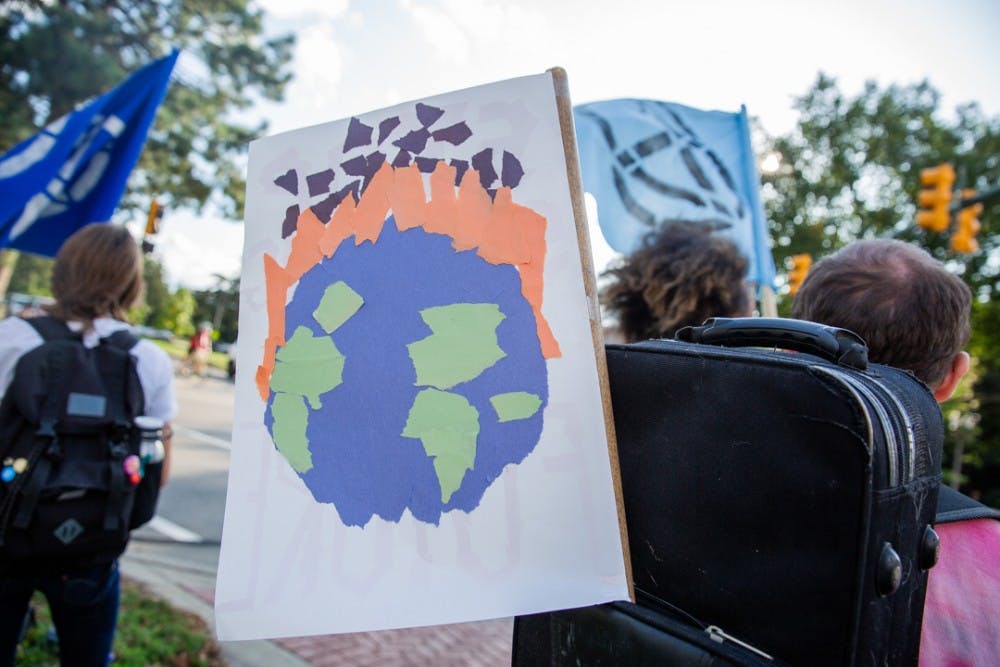Following a climate change panel at Michigan State's James Madison College, students have started to push for climate change justice at MSU, including the reduction of fossil fuels the university currently uses.
“Right now, MSU currently spends $122.9 million in fossil fuel, mining and related initiatives,” comparative cultures and politics junior Sara Millies-Lucke said. “They’re either involved directly in endowments for fracking or fossil fuel extraction or building pipelines, for example. What we want to see is them to put their money where their reputation is.”
Different student organizations such as SunriseMSU and the MSU Divestment Campaign have formed for the explicit purpose of bringing climate change awareness and justice to MSU students through panels and climate strikes. Their goal is to work toward a bigger university-level change.
MSU had accepted an Energy Transition Plan in 2012, which will increase campus renewable energy to 40% and reduce greenhouse gas emissions by 65% by the 2030 fiscal year.
Through the plan, MSU has already switched from using coal to natural gas in 2016 at the power plant, reducing carbon dioxide emissions by 410 million pounds, and is working on a $47 million project of adding new efficient engines at the power plant that will allow better use of campus solar arrays, according to Fred Woodhams, communications director of Infrastructure Planning Facilities, or IPF.
“MSU has been working very hard to reduce its greenhouse gas emissions. The power plant switched a couple years ago from burning coal to all natural gas, and that’s a significant switch,” Woodhams said. “There’s been a significant reduction in greenhouse gases and there’s other benefits like no more coal ash, and it’s resulted in a drop of 30% from a decade ago. We continue to make improvements to the power plant to ensure that it’s even more efficient and reduces its dependence on fossil fuels.”
MSU is also ranked No. 19 by the Princeton Review for the Top 50 Green Colleges.
Though Woodhams said he believes the ranking is good, Millies-Lucke believes the university could do better.
“We’re really unsatisfied with that because one, it shouldn’t be enough to be on that list and two, is just slapping a couple of solar panels over a parking lot enough?” Millies-Lucke said. “We want them to be a real sustainable college and invest in our future as we are here, investing in our own.”
According to international relations junior Giani DiTrapani, the fight for climate justice is not a controversial issue. This is something the students plan to use to their advantage.
“For me, I just want all Earthlings to have a livable and prosperous future,” DiTrapani said. “I believe clean air and water are human rights. ... The elite has jeopardized the world’s — our kids’ — future for their own profit. To fight for climate change at a local level is not only necessary, and it’s not controversial either. Public opinion is on our side.”
SunriseMSU and the MSU Divestment Campaign said they want students to be more aware of the issues surrounding climate change on an individual level as well as a university and global level.
“I know an important part of youth activism and student activism is just telling your story because people often times think that climate change, for example, is this very far and distant issue, but it’s really affecting everyone everyday,” political theory and constitutional democracy junior Jake Nessel said. “We need to start telling our stories and understanding how it’s affecting us and then from there saying, 'This is what we’re doing about it.' We are encouraging our university to divest from fossil fuels because we know it’s impacting us and our climate everyday.”
Though individual changes, such as practicing veganism, vegetarianism and recycling, are good starting steps, Millies-Lucke acknowledges the difficulty of becoming environmentally friendly, but wants to change that system.
“I understand where they’re coming from. I come from a rural setting, so even though I try to take every individual action to be more sustainable, I have to drive and the nearest grocery story is like 25 minutes away. I don’t have the options of organic, local produce. I can’t just walk and find something. So I think from that stance, maybe they need to be advocating for a larger systematic change, so it’s not just the privileged who can be able to live sustainable lives, but for all.”
Support student media!
Please consider donating to The State News and help fund the future of journalism.
Discussion
Share and discuss “MSU students push for climate change justice on campus” on social media.








